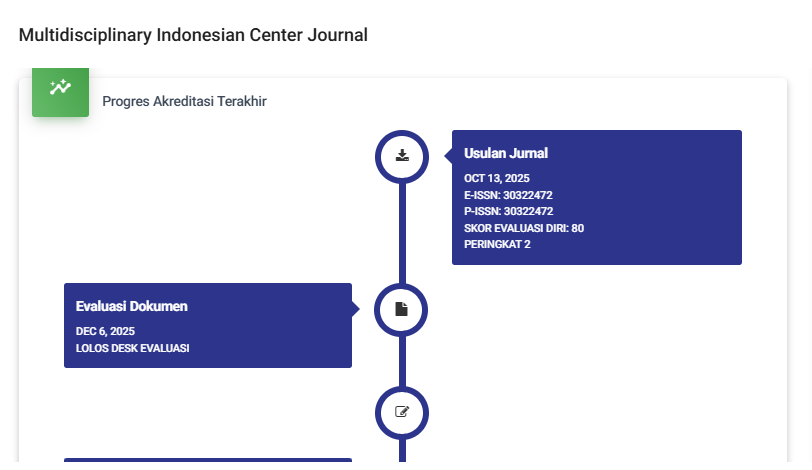THE ROLE OF PSYCHOLOGICAL CAPITAL AS A PREDICTOR OF NURSES' ORGANIZATIONAL CITIZENSHIP BEHAVIOR IN REGIONAL HOSPITALS
DOI:
https://doi.org/10.62567/micjo.v2i4.1413Keywords:
psychological capital, PsyCap, organizational citizenship behavior, OCB, nurses, regional hospitalAbstract
Nurses, as the frontline of healthcare services, are expected to deliver optimal performance that frequently goes beyond their formal duties, thus requiring robust psychological capital to support voluntary work behaviors known as Organizational Citizenship Behavior (OCB). This study aims to analyze the effect of Psychological Capital (PsyCap), which comprises hope, efficacy, resilience, and optimism, on nurses' OCB in regional hospitals and to identify the most dominant dimension influencing OCB. Employing a quantitative correlational approach, this research collected primary data through structured questionnaires distributed to nurses as respondents. The data were analyzed using descriptive statistics, multiple regression analysis, and moderated regression analysis to test variable relationships and the moderating effects of demographic factors. The results indicate that the levels of PsyCap and OCB among nurses are relatively high, with resilience emerging as the most significant predictor of OCB. These findings strengthen the position of PsyCap as an essential psychological resource that fosters prosocial behaviors among nurses, especially in regional hospitals often challenged by limited human resources. The implications suggest that hospital management should design PsyCap enhancement programs, focusing particularly on strengthening nurses' mental resilience to sustainably improve healthcare service quality. This study also contributes theoretically by enriching the literature on organizational behavior within the Indonesian healthcare sector.
Downloads
References
Ad, P., Nk, P., & Percunda, A. D. (2020). HOSPITAL NURSES’ PSYCHOLOGICAL CAPITAL AND WORK ENGAGEMENT-ARE THEY REALLY RELATED? THE CASE OF AN INDONESIAN HOSPITAL. The Journal of Health and Translational Medicine, 23, 52–59.
Ali, I., Khan, M. M., Shakeel, S., & Mujtaba, B. G. (2022). Impact of Psychological Capital on Performance of Public Hospital Nurses: the Mediated Role of Job Embeddedness. Public Organization Review, 22(1), 135–154. https://doi.org/10.1007/s11115-021-00521-9
Chamisa, S. F., Mjoli, T. Q., & Mhlanga, T. S. (2020). Psychological capital and organisational citizenship behaviour in selected public hospitals in the Eastern Cape Province of South Africa. SA Journal of Human Resource Management, 18, 1–12. https://doi.org/10.4102/sajhrm.v18i0.1247
Cho, S. J., & Lim, S. J. (2020). Effects of positive psychological capital, reward on retention intention of hospital nurses. Journal of Korean Academy of Nursing Administration, 26(5), 563–573. https://doi.org/10.11111/jkana.2020.26.5.563
Jin, M., Zhang, Y., Wang, F., Huang, J., Feng, F., Gong, S., Wang, F., Zeng, L., Yuan, Z., & Wang, J. (2022). A cross sectional study of the impact of psychological capital on organisational citizenship behaviour among nurses: Mediating effect of work engagement. Journal of Nursing Management, 30(5), 1263–1272. https://doi.org/https://doi.org/10.1111/jonm.13609
mahmoud, amal, Gabal, S., Goda El Sayed, S., & Mohamed Wahba, N. (2023). Psychological Capital and Compassion Fatigue Among Nurses Working in Port Said Hospitals. Port Said Scientific Journal of Nursing, 10(2), 320–349. https://doi.org/10.21608/pssjn.2023.134173.1194
Ningtyas, M. S., Pertiwi, D., & Saraswati, K. D. H. (2020). The Impact of Perceived Organizational Support and Psychological Capital Toward Nurse’s Work Performance. Tarumanagara International Conference on the Applications of Social Sciences and Humanities (TICASH 2019), 304–308. https://jummec.um.edu.my/article/view/25814
Polat, Ş., Yıldırım, N., & İşsever, H. (2021). Investigation of the Relationship Between Nurses Psychological Capital, Job Performance, and Intention to Leave their Job. Journal of Health and Nursing Management, 8(3), 355–365. https://doi.org/10.54304/SHYD.2021.85866
Puspitaloka Mahadewi, E., & Muchtadin. (2024). The Influence Of Psychological Capital And Affective Commitment On Organizational Citizenship Behavior Of Hospital Staff. International Journal of Science, Technology & Management, 2, 367–372. https://doi.org/10.46729/ijstm.v5i2.1081
Qamhawy, H., Ahmed, H., Metwaly, S., & Ibrahim, H. (2024). Relation between Workplace Bullying and Psychological Capital Among Nurses. Zagazig Nursing Journal. https://doi.org/10.21608/znj.2024.352148
Rahman, R. M., & Kusmaryani, R. E. (2024). Psychological Capital as a Predictor of Organizational Citizenship Behaviour in the Personnel and Human Resources Development Agency employees in West Kalimantan. Devotion Journal of Research and Community Service, 5, 1546–1557. https://doi.org/https://doi.org/10.59188/devotion.v5i12.25384
Saleh, A., Wirawan, H., & Tamar, M. (2020). Improving Health Care Service through Healthy Psychological Capital and Positive Attitudes. International Journal on Advanced Science Engineering Information Technology, 10(4), 1723–1730. https://doi.org/https://doi.org/10.18517/ijaseit.10.4.12429
Syam, R., Afni, N., & Arifin, I. (2021). The Effect of Psychological Capital on Work Engagement of Nurse at Pertiwi Hospital in Makassar City. Jurnal Ilmiah Ilmu Administrasi Publik: Jurnal Pemikiran Dan Penelitian Administrasi Publik, 11(1), 215–222. https://doi.org/https://doi.org/10.26858/jiap.v11i1.21104
Teng, M., & Wang, J. (2023). Psychological capital among clinical nurses: A latent profile analysis. International Nursing Review, 786–793. https://doi.org/https://doi.org/10.1111/inr.12918
Violeta, A., Turangan, A., Dewi, M. S., Ekonomi, F., Bisnis, D., & Mangkurat, U. L. (2024). PERAN MEDIASI KEPUASAN KERJA PADA PENGARUH POSITIVE PSYCHOLOGICAL CAPITAL TERHADAP ORGANIZATIONAL CITIZENSHIP BEHAVIOR (70, Trans.). Among Makarti, 17, 57. https://doi.org/https://doi.org/10.52353/ama.v17i1.626
Yıldırım, N., Coşkun, H., & Polat, Ş. (2021). The Relationship Between Psychological Capital and the Occupational Psychologic Risks of Nurses: The Mediation Role of Compassion Satisfaction. Journal of Nursing Scholarship, 53(1), 115–125. https://doi.org/10.1111/jnu.12607
Yuan, Z., Zhang, X., Wang, F., Jin, M., Teng, M., He, H., & Wang, J. (2023). Levels of psychological capital among nurses: A systematic review and meta-analysis. In International Nursing Review (Vol. 70, Issue 1, pp. 89–96). John Wiley and Sons Inc. https://doi.org/10.1111/inr.12803
Zulfi Ekawaty, Ariyanti Saleh, & Rini Rachmawaty. (2023). Strategi Peningkatan Kinerja Perawat melalui Support Mental dan Gaya Kepemimpinan Kepala Ruangan yang Dimediasi oleh Psychological Capital : Integrative Review. Jurnal Kesehatan, 16(1), 53–66. https://doi.org/10.24252/kesehatan.v16i1.31064
Downloads
Published
How to Cite
Issue
Section
License
Copyright (c) 2025 Eka Yuliani

This work is licensed under a Creative Commons Attribution-ShareAlike 4.0 International License.



























